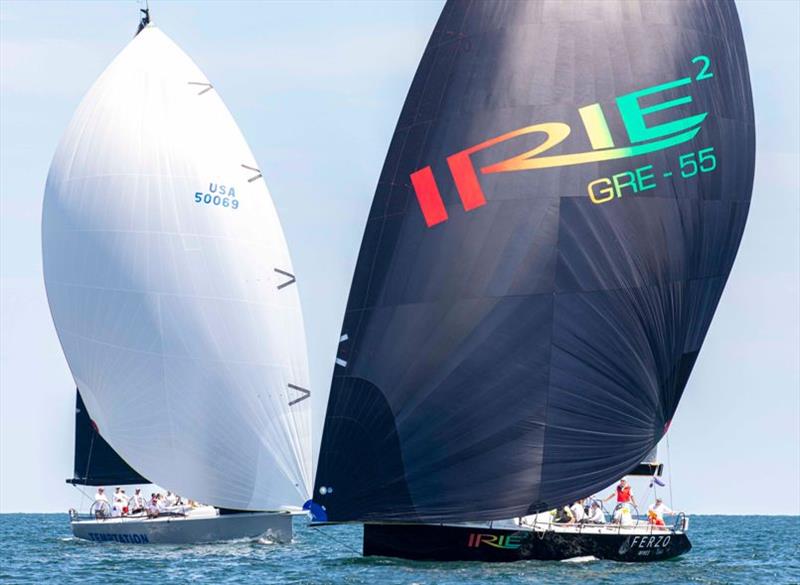
An interview with Alex Nugent on the 2020 Edgartown Race Weekend
by David Schmidt 28 Jul 2020 08:00 PDT
August 1, 2020

2019 Edgartown Race Weekend © 2019 EYC / Stephen Cloutier
2020 might not be anybody's idea of a great year, not to mention a great sailing season, but some regattas are pressing on, despite the backdrop of the coronavirus pandemic, and taking steps to ensure competitor health and safety. One example of this is the Edgartown Race Weekend, which will unfurl on the waters off of the eastern end of Martha's Vineyard on Saturday, August 1. Unlike previous editions of this storied regatta, which is hosted by the Edgartown Yacht Club (EYC), and which has historically offered crews a blend of round-the-buoy and distance racing, this year's edition will feature a single day of long-course racing, however crews will have their choice of two courses to best match their (nautical) horses.
The first of these courses is the 'Round-The-Island (RTI) course, which was established in 1938, making it one of the country's oldest distance-racing challenges. As its moniker suggests, this 56-nautical-mile racecourse circumnavigates Martha's Vineyard, giving participating sailors great views and plenty of tactical opportunities.
The second course, called the 'Round-The-Sound (RTS), was established in 2018. This course runs 20 nautical miles and wends its way around Edgartown Harbor and Cow Bay, following a series of government marks and testing each crew's sail-handling and gear-changing acumen.
I checked in with Alex Nugent, race co-chair of the 2020 Edgartown Race Weekend, via email, to learn more about this exciting regatta.
Can you give us an overview of the two courses—RTI and RTS—that the sailors can choose from?
The course for the primary race, 'Round-the-Island, is an approximate 56-nautical-mile circumnavigation of the island of Martha's Vineyard. The shorter 'Round-the-Sound course is around buoys in Edgartown Harbor and Cow Bay.
'Round-the-Island is the main draw given the length and challenges experienced on the course.
In your mind, what are the best aspects and challenges of each racecourse? Also, what are typically the trickiest bits of the courses for navigators, tacticians and skippers?
[I'm] going to focus on RTI here. [The] best aspect of the race is the variety of different points of sail during the race, allowing teams to utilize full sail inventories and fun equipment. Many races aren't able to offer the dynamics that RTI does.
What are the best-case and worst-case scenarios in terms of weather/conditions for both of the courses?
[The] best case scenario is a 15-knot sea breeze from the southwest. [The] worst case scenario is no breeze, especially when trying to get around the shoals off of Wasque, where the currents move pretty strong.
What kind of boats tend to race the RTI, and what kinds tend to race the RTS? And is the biggest difference between the two camps waterline (LOA), or are other factors also involved?
For RTI, we attract boats of all types, from Grand Prix racers to racer-cruisers. One-designs, particularly J/Boats, make up sizable numbers for the race.
For RTS, we typically see smaller, more inshore-oriented boats.
What kinds of safe-play tactics are you expecting from the racers on the water? Are we talking about standard-issue things like face masks, hand sanitizer and limited crew numbers, or will crews also be expected to self-quarantine ahead of the race? Also, do you expect that sailors will arrive with their usual levels of competitiveness, or is the spirit of this year's race more about getting out on the water for some friendly racing?
We are requiring all teams to comply with Massachusetts health and safety guidelines, and are encouraging additional precautions to most importantly keep the community safe (sailors to stay on boats as much as possible, for example).
Are you seeing more entries that are being crewed by family members or members of the same household this year, given the pandemic?
Nothing substantial, but folks have expressed excitement more than usual about getting family members on the water.
What are the standing elapsed-time records for each course? Also, based on the entries that you're seeing, do you think that 2020 could see a new record (or records) established?
I don't have the time records for each course in hand-I will say for this year, the addition of the M32's allows for a new record to be set.
Can you tell us about any efforts that you and the other regatta organizers have made to try to lower the regatta's environmental footprint or otherwise green-up the regatta?
We have digitized our entire regatta processes and infrastructure this year, and EYC have for years been encouraging sailors and our own community to meaningfully reduce single-use plastics and materials. Our EYC team is extensively diligent with making sure visiting teams keep the harbor environment clean.
Anything else that you'd like to add, for the record?
Stay tuned for 2021-we have a lot of exciting enhancements planned for next year's event. Dates for 2021 will be released shortly after the conclusion of RTI 2020.